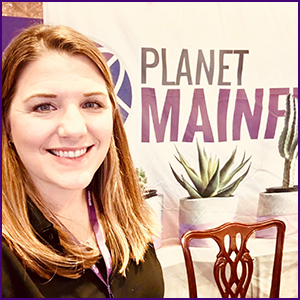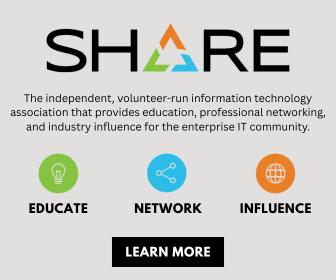For observability and resiliency month, Amanda Hendley sat down for the Planet Mainframe podcast with Lifetime IBM Z Champion Darren Surch. Darren is the CEO of Interskill Learning, the world’s most delivered and credentialed mainframe training. Darren and Amanda took some time to talk about career resiliency, the ability to adapt to changes, challenges, and setbacks in one’s career while continuing to grow and thrive. During their discussion, Darren highlighted several key concepts essential for building career resiliency, including continued education, network development, mentoring, and thought leadership. He emphasized that staying current with industry trends through continuous learning, cultivating a strong professional network, seeking out mentors, and contributing to thought leadership are all critical strategies for maintaining and enhancing career resiliency in today’s rapidly evolving job market.
Transcription
[00:00:00] – Podcast Open
Welcome to the Planet Mainframe podcast, your gateway to the Forefront of technology in the digital age. Join us as we dive deep into the heart of tech innovation, where industry experts and thought leaders gather to explore the ever-evolving world of mainframes and beyond. In each episode, we’ll unravel the complexities of the digital realm, dissecting the technology that shapes our lives. From the giants of mainframe computing to the latest breakthroughs in AI, cybersecurity, and more, we’re here to guide you through it all. Our mission is clear to bring you the brightest minds, the boldest ideas, and the most captivating stories from the dynamic world of tech. Whether you’re a tech veteran or simply tech curious, get ready to embark on this enriching journey with us. So fasten your seatbelts for a world of knowledge, innovation, and inspiration. Welcome to the Planet Mainframe podcast.
[00:00:53] – Amanda Hendley, Managing Editor, Planet Mainframe
Welcome, everyone. My name is Amanda Hendley. Joining me today is Darren Search. If you haven’t met him, you really should. Darren is the CEO of Interschool Learning, the world’s most delivered and most IBM-credentialed mainframe training. He’s a mainframe industry veteran, and he’s only one of two people with the lifetime IBM champion for IBM Z. Welcome, Darren. Thanks for joining me again.
[00:01:21] – Darren Surch, CEO, Interskill Learning
Amanda, good day. We have some good conversations, don’t we? We meet at GSE UK, God’s Share Europe UK, and Share conferences, and other podcasts and things. So, yeah, terrific to chat with you. And congrats on everything that Planet Mainframe is doing as well.
[00:01:38] – Amanda Hendley, Managing Editor, Planet Mainframe
Well, thank you. Thank you. And I’m looking forward to seeing you again in a couple of months for some Coming events. Yeah. Right now at Planet Mainframe, we’re talking about this resiliency concept. And I specifically wanted to reach out to you, Darren, because I wanted to talk about this idea of career resiliency, taking a little bit of a spin on the technology topic, but how does that apply to our careers? And just give me your initial thoughts on maybe how you would define career resiliency.
[00:02:16] – Darren Surch, CEO, Interskill Learning
Yeah, I mean, it’s a terrific question. And being 30 odd years in the mainframe education space, this is this is right where we live. Career resiliency, I suppose, is just your ability to manage manage your career and stay right on top, stay the best person. So if things go wrong, you’re the best person in the industry with technology, with your company, whatever it is, you’re in the best position to leap into something next. But even when things are going really right, if you’re keeping up with your lifelong learning and managing your career and your professional network, then you’re in the best position to take advantage of when new technologies come up or big new opportunities changes in the industry, exciting new opportunities in your career come up. You’re not looking at it going on now, better to do some training and learn some things so that I can apply for this new position or run this new project or or anything else that’s going to lead my career forward, you’re already in that position because you’ve been constantly preparing yourself. So it’s critical. I mean, anyone out there, this career resilience is important for your life and happiness and success and all of those good things, but also for mainframe organizations, the big companies around the world that run the mainframes.
[00:03:37] – Darren Surch, CEO, Interskill Learning
They’ve got to make sure that their personnel are resilient and able to jump into change and embrace change and see opportunities and that stuff. So right across the industry, I know the hardware and the software get most of the attention, but mainframe skills is always talked about. And that career resiliency is the larger picture around the mainframe skills.
[00:03:59] – Amanda Hendley, Managing Editor, Planet Mainframe
And do you think it is particularly different in the mainframe industry or specifically relevant to people in mainframe?
[00:04:09] – Darren Surch, CEO, Interskill Learning
No, I think career resilience is important across all things. I think it’s becoming more important in the mainframe space. I go back 20 or 30 or 40 years and the commitment to lifelong learning probably wasn’t important. If you had your mainframe skills, they were good for a long time. If you ever get a chance to Google, I think called the “half life of skills”half-lifehalf-lifehalf-life. So the amount of time that your particular skills are productive for you until you have to relearn or update them or modify them some way. The half life of skills 20 or 30 years ago was five, six, seven years. You’d learn how to program COBOL 30 years ago and you could just continue to program COBOL for a decade without too many changes to your skills. But these days, with all of the changes in the mainframe space, very, very, very quickly, your half life of IT skills these days is measured in six months to twelve months. So you need to be managing that and making sure you’re learning the right skills. And again, that commitment to lifelong learning, making sure that you’re keeping your skills up and I suppose looking ahead and saying, okay, what are the skills that are going to really be in demand two years from now, five years from now?
[00:05:26] – Darren Surch, CEO, Interskill Learning
And trying to find one of those that you’re passionate about and diving in and making yourself some an expert or at least very knowledgeable about that. So short answer, a long answer to a short question. But I think in the mainframe space, it’s becoming more and more and more important as the pace of change speeds up, which we’re all experiencing now.
[00:05:51] – Amanda Hendley, Managing Editor, Planet Mainframe
And I think you’re absolutely right that if it wasn’t the longer half life of skills, at least I think people be more specialists years ago. Now, with that pace of change and with new technologies coming in and, I would say, even different voices from the organizations that you’re in having different inputs into technology, that’s really impacting what skill sets you need. And making people have to be very multi-purpose in their work. Exactly.
[00:06:28] – Darren Surch, CEO, Interskill Learning
People must be versatile. Mainframe is part of the hybrid cloud now. So programmers need to be polyglot. They need to know multiple languages. They need to know containers. They need to know all sorts of other things. Open source is starting to come into a lot more play in the mainframe space as well. So there’s an awful lot of stuff, an enormous lot of stuff that you have to know. Again, if you’re happy with a career that sits around, then you can probably get by. But be successful and And be the person at the front of the queue when opportunities come up. You can do that by just embracing the industry, embracing your career, keeping up with the skills. I mean, we can talk about this as we go along, but that professional network is just incredibly important. Do some coaching or mentoring, be mentored. Everybody should have one or multiple mentors in the mainframe space on a technical level, on a career level. Linkedin is fantastic. Back in the day, your professional network revolved around going to share conferences. And I just learned the other day, I’ve known share for years, but I just learned the other day that share actually predates the mainframe.
[00:07:47] – Darren Surch, CEO, Interskill Learning
So share was organized a few years before the system 360 came out in 1964. Happy birthday again, 60th birthday again to the mainframe a few months ago. But yeah, share So there even predicts that. So building a network was back before the Internet and so forth. You’d go to share conferences, as you do today, and catch up with friends and get to meet new people and discuss industry things and so forth. That was it. But LinkedIn’s just taken that to a whole new level. It’s amazingly how you can connect with mainframers all over the world and swap ideas and so forth. Even things like the remarkable Steven Perva and is a Discord network that he started up. I get cool points from my 20 year old son for being on Discord, the gamer platform. But yeah, the Discord group get together and chat mainframe from all around the world, just open and honest and talking about everything. So social media has really opened up your ability to enhance your professional network. And I have to say as well, Planet Mainframe, You know, you openly ask people to write articles for Planet Mainframe. And what a great way to get noticed and build your brand, build your professional profile and get to meet other people as well by what you write and interacting with Planet Mainframe.
[00:09:14] – Darren Surch, CEO, Interskill Learning
So, again, you’ve really changed the playing field.
[00:09:19] – Amanda Hendley, Managing Editor, Planet Mainframe
Thank you. So it’s a great pivot. We talk about training and training is important and it’s important to make make sure that you’re keeping up with what the next thing is and what the next technology is. But you’ve touched on your network and how valuable, important it is to build your network. I know you’re someone who’s done a great job at that. You specifically mentioned LinkedIn and conferences. For someone that’s maybe new and hasn’t been to a lot of conferences or hasn’t seen a lot of immediate value of their network, maybe they’re still in their first job, so they actually haven’t hit that point of saying, Oh, I need to meet someone at my next job. What do you think are some ways that people could start building their network? I mean, you mentioned Discord, but what are those tiptoe steps in?
[00:10:19] – Darren Surch, CEO, Interskill Learning
Yeah, pretty much what I mentioned a minute ago. I mean, definitely have a LinkedIn profile and be vocal. Don’t be afraid. And I know someone asked me recently, what would you tell the 25 year old Darren’s starting in the mainframe space from today? And I would say, speak up and connect with people. I, as I’ve said a few times before, I grew up in the bush in Australia. The nearest town to our farm was population 11. And growing up in the Bush, everybody helps everybody. And it’s a real sense of community. And people know each other. And funnily enough, I’ve worked in the professional world, but the mainframe community is very much like that. It feels like a small town sometimes. Seeing your mainframe just want to help out. So don’t be overawed. I know I was when I first came into the mainframe space. I’d look at all of these brilliant-looking, older mainframers and think to myself, good grief, I don’t want to say a word because I’m going to make an idiot of myself here. But no, the mainframe industry or the mainframe community is remarkable. We all love the mainframe and everybody in the mainframe space, the mainframe community knows how important it is that the next generation of mainframers are part of the community and feel the passion and know about the systems.
[00:11:42] – Darren Surch, CEO, Interskill Learning
And they’re going to carry this system that we love for generations. So don’t be afraid to speak up, again, virtually on LinkedIn groups, on Discord, you name it. Even if you can’t get to a face to face, I think going to a SHARE conference or a GSE is just phenomenal. A great way to just immerse yourself and meet people and and find people of like mind and stuff like that. But don’t be shy, I suppose. Even if you’re just listening in, like things like that Discord So they’re really cool to call the chats that they have every couple of weeks. Even if you’re just listening in, that’s fine. But I think you’ll find that people are talking and then all of a sudden they’ll get onto a topic that you’re really passionate about and you’ll find yourself just going, hey, I think this, this and this. And then all of a sudden all these people will be starting to connect with you on LinkedIn going, what you said was fantastic. Let’s talk some more. So I do ramble on. But yeah, the mainframe community is, I mean, it’s a home. It really is. It’s full of such amazing, remarkable, quirky, interesting people, you’ll definitely, don’t be shy, speak up.
[00:12:51] – Amanda Hendley, Managing Editor, Planet Mainframe
I think that the mainframe community, what I’ve seen in my experience in it is that it’s a big but close knit community. There’s a lot Absolutely. Friendly people who are willing to share what they know and talk, and they want to get other people in, that mentoring concept. I think you would easily find a home in this space. Then you have individuals, too, who… I don’t think this is a necessary thing for career resiliency, but people build a brand that really dive in and start talking about an area that they’re really passionate about. Maybe it’s open source, or maybe it is building that next generation of main framers. But there are people that have really developed their own brand. And I have a feeling that is something that makes this concept of career resiliency easier.
[00:13:55] – Darren Surch, CEO, Interskill Learning
Absolutely. If you’re well known and you have a voice, which again, it’s not such a big thing. Don’t think that it’s enormous or it’ll take all of your time. Just speak from the heart. When you’re on LinkedIn and you start to follow people I follow key people that have things to say. And I get there with my coffee in the morning on my iPhone and I’m just scrolling through my LinkedIn feed and it’s like an article from such and such or a blog post. And I’m like, oh, that’s interesting. And I read that. I’m getting smarter. So that goes to training. Training doesn’t have to be going sitting in a class. Training is reading articles by industry experts on LinkedIn. Training is doing e-learning, training is coaching and mentoring sessions. Training is all sorts of things. But I’m reading my LinkedIn feed and getting to know these people or With the algorithm, seeing an article from someone I don’t follow or I don’t know, but I’m thinking, oh, this is fantastic. This is really interesting. And then you can follow them and maybe reach out to them with a message and say, really loved your article.
[00:14:56] – Darren Surch, CEO, Interskill Learning
Guaranteed, they’ll say, oh, thank you. And suddenly you’re connecting and building up your network. So it’s not hard to do. It’s just being open and friendly. And it’s part of embracing lifelong learning. Don’t just go in to work and do the same thing every day. Try and stay connected. You’ll learn from other people in your professional network, as well as doing structured training and so on and so forth.
[00:15:21] – Amanda Hendley, Managing Editor, Planet Mainframe
So shifting a little bit to an area that you’re an expert in this education and certification space, there’s a lot of ways you can go here.
[00:15:34] – Darren Surch, CEO, Interskill Learning
Yeah, yeah. I mean, mainframe education, I suppose back in the early days of the industry, there was classroom training and a lot of on the job training. It was almost like apprenticeships back in the early days, people would start and mount tapes or start cutting code. But learn on the go with senior people or other people around you showing you how to do it and making mistakes as you went, hoping that flames weren’t going to shoot out the side of the mainframe. You’d make mistakes as you went and learn as you went. And again, like the apprenticeship or on the job training. But given the scale of the industry now, again, little self-serving, but And Inderskill, my company does online mainframe training, and we’re the biggest. We delivered over a million hours of training last year. So we’re the biggest deliverer of mainframe training in the world. I think most organizations provide some classroom and the opportunity to go to conferences and And hopefully some coaching and mentoring and a resource of e-learning so that there’s training at people’s fingertips. They don’t have to wait for it. And all sorts of other things that make up that nice, it’s almost like a meal.
[00:16:45] – Darren Surch, CEO, Interskill Learning
You don’t want to go and sit down and just have a steak put in front of you there. That’s nice for a while, but you need some variety, you need some different ingredients, you need some different tastes and all of that stuff when you eat. And it’s the same with learning. You’ll have different types of training you more than others and things that speak to you, things that you learn better from different methodologies and so forth. But you did mention the digital credentialing, so it’s certification. That was a game changer It was eight years ago, IBM started the IBM digital badge program with the Credly platform. And holy cow, it’s really changed the face of the industry. And if you’re on LinkedIn, great way to start connecting with people in the mainframe space by looking for these IBM digital badges for mainframe topics. They are flying around everywhere. But human nature being human nature, if you’re busy as a mainframe and you’re working and you get to December 31st and go, I didn’t do any training this year. I was busy. Next year, I’m definitely doing some training. Human nature is just you get busy and it’s hard to find time for training.
[00:18:02] – Darren Surch, CEO, Interskill Learning
But the badges have just exponentially increased the amount of training done across the industry by being gamification, but just by being something that you can show your skills. Show your your expertise and show it to the world so that your company can say, hey, this person that works for our organization has an IBM benchmarked skill, not just saying, I know JCL or I know zOS or I know COBOL. Well, do you? How much do you know it? At what level? Who taught you? Et cetera, et cetera. The the IBM credentials benchmark that stuff. So according to IBM, you know to that level exactly what you need to know in this other topic area or as you mentioned with certifications, the the IBM professional certificates are job role focused. So they say this person knows how to be a mainframe computer operator to level one or level two or level three. This person knows how to be a system programmer to level one, two, three, security analyst, application programmer, etc. Those are paths of 60, 70 hours of training. So they’re longer term intensive with exams and all that stuff. But this is like a certification.
[00:19:20] – Darren Surch, CEO, Interskill Learning
It’s a very, very impressive credential that you can stick on the front of your LinkedIn profile and in the signature block of your emails and so forth and probably say, hey, I’ve And I’ve got an IBM professional certificate for my mainframe job role, shows that I really know my stuff at a benchmark level. So the credentials have really helped with this embracing lifelong learning. They make people interested in keeping their skills up and also staying ahead of the game. I’m rambling a little bit. I’m thinking of a culture of learning. So I don’t want to put all the pressure on mainframeers out there. And so you’ve got to drive your career and so forth, which is what career resilience is about. But this should come from the top down as well. This should come from organizations providing the training, providing the culture of learning, rewarding people that are doing all of this training and have the skills by promoting them internally or giving them new projects, which is what a culture of learning is. It has to come from the organizations as much as it has to come from personnel. Mainframe organizations have to empower their mainframe workforce to have career resiliency, to really be the best that they can be.
[00:20:38] – Darren Surch, CEO, Interskill Learning
And it pays off the ROI on it. It pays off for the companies. It It’s a no brainer.
[00:20:47] – Amanda Hendley, Managing Editor, Planet Mainframe
I remember there was thinking years and years ago about, I don’t want to train up my employees to leave me. And then they do this, research comes out that says, no, your employees will leave you if you’re not training them up and investing in them. And then what you’re left with is employees who don’t care that they haven’t leveled up in their education.
[00:21:12] – Darren Surch, CEO, Interskill Learning
So that’s the joke. If you think it’s If you think it’s expensive to train your personnel and have them leave, you should see how expensive it is to not train your personnel and have them stay. It’s true. I mean, companies are successful based on skills of their workforce. You can work with hardware and software and increase your performance by a fraction. But really highly skilled mainframe workforce is going to lift your productivity and decrease your downtime and come up with that next big, amazing, mind-blowing idea that launches your company to the front, massive competitive advantage. All of these things come from from good education and again, career resilience. But the the other thing is people, mainframe personnel vote with their feet, I think is the saying. You know what I mean? If a mainframe person is working with a company that’s not providing them any training and not giving them the skills to do their job and they’re coming in to work each day and thinking, I’m too afraid to do anything because I haven’t been trained and I’m going to make a mistake if I do something here. So I’m just I’m going to just sit.
[00:22:25] – Darren Surch, CEO, Interskill Learning
No one wants to work like that. And people will go and find another job with With an organization that is committed to their career, that is showing loud and clear that we’re going to give you the tools to make you awesome at your job. And we’re going to give you the tools to do other jobs if something else makes you more passionate. So this is where the most skilled and the most intellectually curious and the most promising personnel are going to settle. They’ll go to companies that are really going to support them in this stuff. And mainframe organizations cannot There’s enough retiring as it is to replace. You can’t afford to start losing extra people just because you’re not supporting them in the way they need to. So mainframe orgs really need to stay on top of that.
[00:23:13] – Amanda Hendley, Managing Editor, Planet Mainframe
So when I think about career resiliency and what do I need to do to stay ahead of the game or prepare for my next role, what are some of those skills that I need to be looking for? And I guess they could be soft skills, but I think more of that, what’s the next tech skill I need to be getting?
[00:23:37] – Darren Surch, CEO, Interskill Learning
Yeah, it’s changing fast, isn’t it? Goodness gracious. 34 years I’ve been in the industry, which doesn’t make me one of the longest ones in the industry, but that’s been enough time. And it’s just accelerating all the time. I mean, you know, IBM Watson. So AI is incredibly important. You really should be just for your career resiliency, again. And again, there’s a positive and a negative. If something goes wrong at your company or if things are shut down or if people are laid off, you need to have your career. You need to have the skills. You need to have the professional network. You need to have the brand. You need to have done all these things so you can go out and get another job. That’s on the downside. But even on the upside, when things are going really well and new technologies are getting brought into your organization. You want to be the person at the front of the line when they say, okay, who’s going to lead this new project or who’s going to lead this new department or who are the key people we’re going to put in the team for this new project?
[00:24:34] – Darren Surch, CEO, Interskill Learning
When AI starts really getting rolled out of your organization, you want to be one of the people that has the AI skills and has a bit of a brand and has written an article on Planet Mainframe or something on LinkedIn so that other people have noticed it. And you’re seeing this knowledge a bit of a leader. That way your career opportunities find you. You’re not just in one, you’ve got a promotion, you’ve got to shift into something you’re really passionate about in a new technology that all of a sudden you find yourself one of the industry leaders because of the work you’re doing. So AI, quantum, I think is quantum is a bit of a slow burn and people are interested but don’t really quite know what it is and exactly how it will be used and so forth. I spend as much time as I can. One of my mentors is Jack Ware, who is just brilliant on quantum. And he I talk to him whenever I can because he talks to me about stuff that quantum will be used for. It’ll be part of the hybrid cloud, not for all companies because of the way it computes.
[00:25:43] – Darren Surch, CEO, Interskill Learning
But for some companies, it’ll be part of the hybrid cloud with the mainframe and other systems. And there’s not many people out there that have the skills. So pick up some skills or some basic knowledge, even or just read stuff on LinkedIn that people write or do a free course here or there. Or IBM’s got Qiskit, I don’t even know how to pronounce it, but you can actually sign in and play around and program some quantum Absolutely free. I mean, IBM understands that people need to have the skills when companies start embracing it. So you can without too much work and just as a bit of fun. And a lot of mainframeers are pretty good at that. Oh, I might try this, I might try that, I might code something here, I might try this new language. Mainframeers are typically pretty inquisitive people. So learn those. I suppose the core skills, the new languages that are coming in, Python and Java with what’s next. Learn how to use generative AI, learn how to use ChatGPT for goodness’ sake, but just on that level. But be picking up skills all the time. And I suppose that’s another another facet of career resilience is that looking forward and being positive.
[00:27:09] – Darren Surch, CEO, Interskill Learning
Even when something doesn’t go quite right, it’s an opportunity. You might branch out, you might move somewhere else. But even when things are going right, looking forward, looking for opportunities, saying this looks like it might be something, again, like AI a couple of years ago. Ai looks like it’s really going to start to be something. I’m going to read a bunch of articles from industry experts or I’m going to do an AI course or something like that. But then two years later, when everything’s AI, then you’re one of the people that’s got the skills and is at the front of the queue. Great, great for your career. I do ramble on. Thank you.
[00:27:47] – Amanda Hendley, Managing Editor, Planet Mainframe
No, I think this has been great and really helpful. And for someone that is wanting to make sure that they’re, I want to say, getting the most out of their career, Why would you not?
[00:28:01] – Darren Surch, CEO, Interskill Learning
I mean, we are a short time on this rock and we work to pay the bills often. But boy, if you’re doing something that you’re passionate about and achieving success, it makes it a whole lot more fun to come to work and do stuff. So it doesn’t take that much. You know what I mean? It’s not like an extra job to ensure career resilience. Just manage your career, get a mentor who can advise you on all of these sorts of things and answer questions and connect you with people. This is another part of your network. Mentors will connect you with their circle of friends. And you say, oh, I can’t understand this. And they say, okay, talk to this person. And then suddenly you’ve got another person in your network. So this is all just social. And it’s talking to people who are interested in the same things as you. You got to put a bit of work in because you really need to be training. But training is not always a hard task. It can be reading articles. It can be getting And you’re involved in conversations and and user groups and things like that, which is a fun way to learn and a great way to learn talking to your mentor about things, etc.
[00:29:11] – Darren Surch, CEO, Interskill Learning
So it doesn’t have to be such a hard task. But don’t just sit there and let the wind blow you where the wind wants to blow you or be at the mercy of business or technology. Try and be one of the people that guide this thing. And it’s life’s great. I love this industry. I mean, it’s just an exciting place to be. This is a system that runs the business world. This is how the Western world lives. This is how we in the Western world live the way we do because of the things that we have that run on the mainframe, all the big business and everything else we know. So great industry to be involved in. Why not be one of the leaders in it?
[00:29:53] – Amanda Hendley, Managing Editor, Planet Mainframe
Yeah, absolutely. Well, it has been so nice to talk to you about career resiliency. And I know if anyone is looking for a training, they can head your way over to Innerskill and find out. I mean, there’s baseline training, there’s getting the basics down, and then there’s exploring what’s next in mainframe. Thank you for joining me today, and look forward to the next time we get together.
[00:30:23] – Darren Surch, CEO, Interskill Learning
Always terrific to chat with you, Amanda. Thank you.
[00:30:27] – Podcast Close
Thank you for tuning in to another enlightening episode of the Planet Mainframe podcast. We hope you’ve gained valuable insights and discovered new horizons in the world of technology. This is the Planet Mainframe podcast signing off. Stay curious.









0 Comments